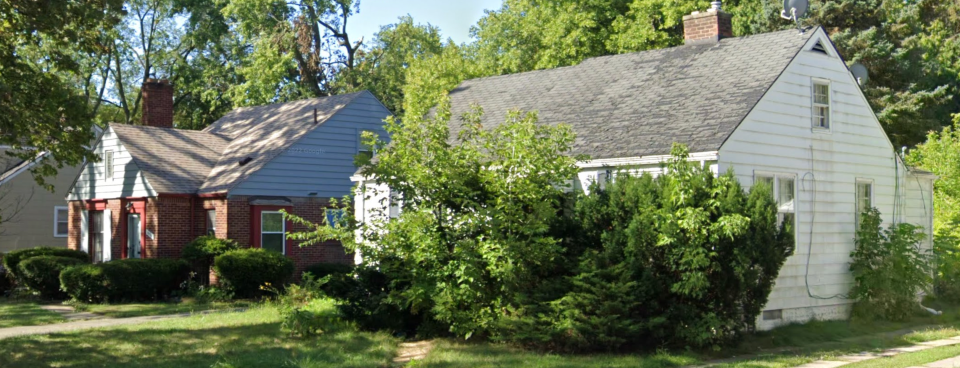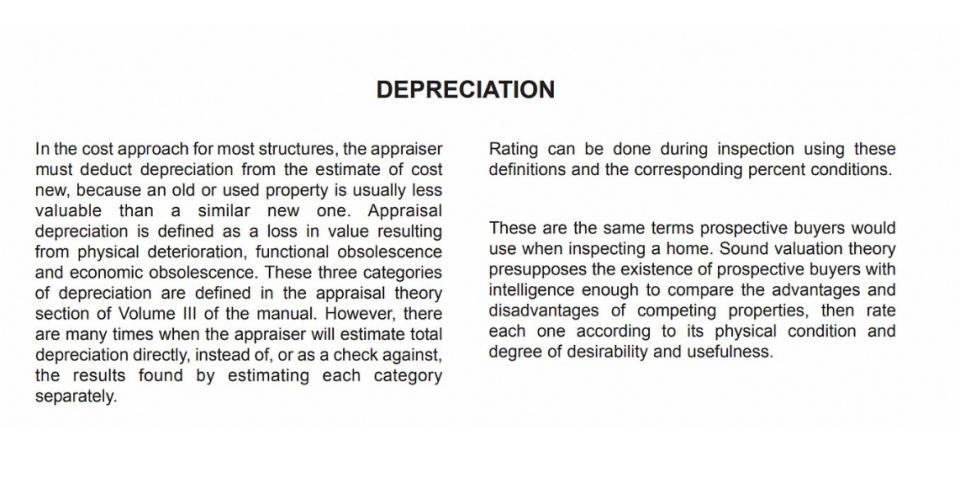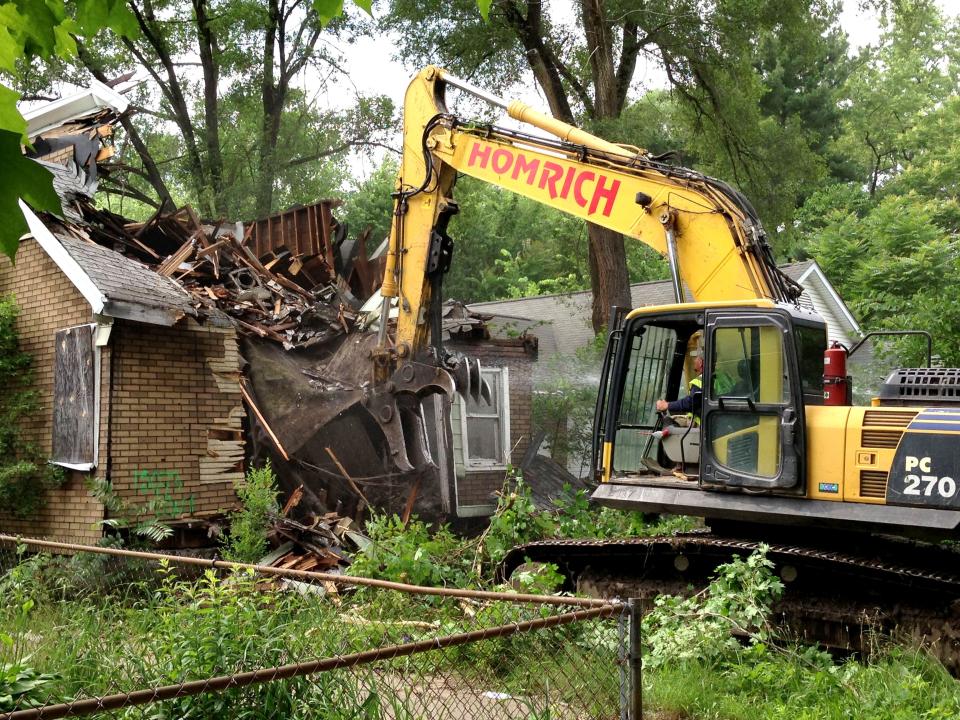Property tax burden falls on owners of occupied homes in good condition | Opinion
In far northwest Detroit, at the very corner of the city, there is a vacant home owned by someone in Southfield. Judging by Google Street View photos, the home has been vacant for at least six years. There are plenty more like it out there.
Next door is another home, this occupied by its owner. For at least six years, this homeowner has, without realizing it, shouldered part of the property tax burden for the apparently absentee owner.
Why? Because the way we tax property in Detroit, in Michigan, and in much of the country rewards the owners of unused land and dilapidated, vacant homes with lower property tax bills, while putting the burden of property taxation on the owners of occupied homes in good condition.
To put it in starker terms: Detroiters are paying speculators’ property taxes.
A land value tax could change that.
A land value tax reduces (or eliminates) the value a structure adds to a property’s tax bill. Instead, it primarily taxes the value of the land. Such a change requires approval by the Legislature, then the Detroit City Council, and finally from voters.
But Detroit’s Land Value Tax proposal is currently stalled in the state House. A failure to move it forward will perpetuate a system that unfairly shifts the tax burden onto homeowners, while incentivizing land speculation.
Speculators cause real harm
I’ve worked on property tax policy in Detroit and cities across the country for 12 years, with the property data company Regrid, where I am vice president of research and development, and before that, leading philanthropic housing programs at the Rocket Community Fund. I have spent years working on tax foreclosure reform in Detroit, and have seen the damage wrought by speculators on this city. I've realized how much harm comes from levying low property taxes on vacant land and deteriorated structures that allow absentee owners to sit on disused property indefinitely.
(Some members of the Detroit City Council have recommended eliminating property taxes altogether. Setting aside the catastrophic revenue implications (for all who rely on property taxes, not just the City of Detroit), this is a proposal hostile to Detroiters — whose services would suffer — and massively beneficial to speculators. Instead of having to pay very little to sit on unused land, speculators would be rewarded by having to pay nothing at all in property taxes, all the while choking off housing supply and productive use of land for the neighborhoods around them. It should be a nonstarter.)
I don’t think the city’s land value tax proposal goes far enough. Mayor Mike Duggan's original proposal sought a much deeper cut of property taxes and a much higher tax on land. The current proposal has the greatest implications for vacant land, less so for vacant structures. But it’s a step in the right direction, and one that seems clearly deferential to what is politically possible. So it goes. Still, it is important to understand the problem behind the proposal.

Policy that rewards blight
In 2023, that owner occupied home in northwest Detroit has an assessed value of $17,800 and a taxable value of $7,200, making for an annual tax bill of about $500 at Detroit's homestead rate of 67 mills.
Meanwhile, the Southfield-owned vacant house next door has an assessed value of $11,300 and a taxable value of $3,500 — looking at the same set of mills, that’s an annual bill of $235.
Although both properties get the same set of city services, that’s $265 a year in savings for the vacant house. A tax system that charges taxes based on a house’s state of repair rewards the absentee owner who leaves the property in disrepair.
In Michigan, the basis of the property tax is market value. Naturally, an occupied home in good condition has a higher market value — and thus a higher property tax bill — than a neighboring vacant home in terrible condition. Meanwhile, the owner of the vacant house next door can appeal a high assessment, pointing to the low market value of the house and its deteriorated condition.
This isn’t a failure of the system, it’s the way the system is designed to work. It’s right there in the Michigan Assessor’s Manual:

It’s not an isolated example
The examples from northwest Detroit aren’t cherry picked. Across Detroit, vacant homes benefit from lower taxable values, and thus lower tax bills, than occupied homes.
In Detroit, properties are assessed by geographic regions designated by something called "economic condition factors." The idea is that these regions, as the name implies, should capture neighborhoods with similar economic conditions, allowing the assessment process to compare similar properties under similar market influences.
There are 135 such regions in Detroit with enough residential properties to compare the average taxable value of occupied and vacant homes. Using tax roll data from 2023 and US Postal Service vacancy data from Regrid, I looked at each of those regions.
In 105 of the 135 regions — that's 78% — the average homeowner is paying more in property taxes than the average owner of a vacant house.
North of Grand River, in the area around Lyndon and Greenfield, the average occupied home’s taxable value is 18% higher than the average vacant home.
Along Woodward near the old Chaldean Town neighborhood, the average occupied home’s taxable value is 45% higher than the average vacant home.
In Banglatown, where I’ve celebrated the community’s work restoring hundreds of vacant homes in my Substack, The Chargeback, the neighborhood is rewarded for that effort with a whopping 200% higher taxable value on the average occupied home, translating to $350 more per year in property taxes.
How would things be different under a land value tax?
Let’s return to those homes in northwest Detroit, and consider how that picture might look under a land value tax.
Right now, in Detroit, about 96% of property tax is based on a house's value, not the land it's sitting on. In a hypothetical land value tax proposal, the majority of the property tax would be based on the land's value, while a much smaller part is based on the structure’s value. The aim is to keep the total tax collected the same, just redistribute how it is generated.
Suppose two neighboring properties — one well-maintained by a homeowner, the other owned by an out-of-town speculator, vacant and run-down. Under this new tax setup, since the parcel size and location of both properties is the same, property taxes based on land value are the same. The well-maintained home still owes slightly more tax, but it’s a lower amount overall, because the structure accounts for a smaller portion of the property’s taxable value.
Imagine applying a land value tax to these two properties, with the goal of collecting the same revenue. The result? The homeowner’s tax bill drops by 25% (from $500 down to $378), while the out-of-town speculator sees a 42% tax hike (from $235 up to $335). The total taxes are the same, but the absentee owner is no longer rewarded for their dereliction of the property. It’s a win for the neighbors, and a nudge for speculators to rehabilitate or sell their properties. Either way, investments to rehabilitate the house get an automatic tax break.
I would urge the city to push beyond its focus thus far on vacant land, and consider the benefits of an approach like this that has implications for vacant structures as well.

So what happens next?
Let’s consider the possibilities for Detroit’s stalled proposal, which again focuses primarily on forms of vacant land, should it make it through the legislative process and be approved by voters next year. If it is enacted, as Mayor Mike Duggan has outlined, 97% of homeowners will see a tax cut, while owners of vacant land (with some exemptions like side lots and gardens) will see, at least percentage-wise, a substantial tax increase.
Here are the scenarios that might follow:
Speculators pay the higher taxes still do nothing with the land. It’s a possibility — more than doubling the taxes on a residential vacant lot, as the mayor has proposed, is a large percentage increase. But the dollar increase may not be enough to cause a change in behavior, unless the speculator has a large portfolio of vacant land.
Increased holding costs make it less comfortable to sit on a vacant property, which could spur an absentee owner or speculator to either invest in getting the property into productive use themselves, or sell it to someone who will.
The speculator stops paying property taxes, and the property winds up in tax foreclosure, or long-term tax delinquency. The city must address this very real possibility if the land value tax moves forward.
Tax foreclosure may not be the worst thing for speculator-owned vacant homes and land, so long as the city is prepared to exercise its right to take control of these properties before they actually reach the annual tax foreclosure auction. The next job would be a more thoughtful approach to getting properties into the hands of people who will put them into productive use.
Long-term delinquency, to me, is worse than tax foreclosure. Many speculators are adept at paying just enough to keep properties out of the tax foreclosure auction, without ever paying the full debt. This is a worst-case scenario, because the city gets neither the full tax, nor the productive reuse of a vacant home. Preventing this outcome at scale should be taken extremely seriously. If the land value tax passes, there needs to be real work and coordination with the Wayne County Treasurer’s office to compel payment from strategic speculators.
The two homes in northwest Detroit paint a clear picture of the inequities inherent in the current system, and how a land value tax could be a catalyst for change. Yet, there's more to be done to prepare the city for this transition. It’s worth having a broader conversation around extending the land value tax to account for vacant structures, to further dissuade speculative holding of deteriorating properties.
But it's clear that something has to change.
For too long, speculators have had their way with the land of Detroit — pushing out residents, suffocating neighborhoods and profiting at the cost of Detroiters. A land value tax won't fully stop speculators from playing ugly games. But it will make their strategies costlier, and make it cheaper for Detroiters to put neighborhoods back together.
Alex Alsup is vice president of research and development at the property data company Regrid. Read his research and analysis regarding property tax foreclosure and Detroit housing issues at The Chargeback: detroit.substack.com. Submit a letter to the editor: freep.com/letters.
This article originally appeared on Detroit Free Press: Duggan's Detroit land value tax would discourage speculators

